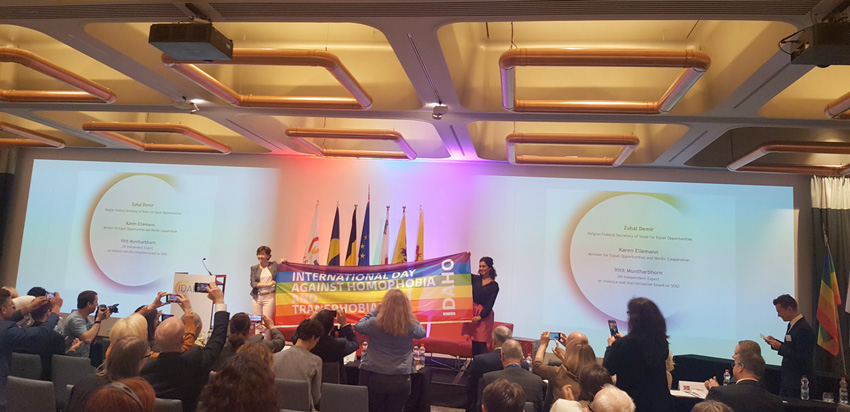
On May 18 to 19, the representatives of the Ministry of Justice (MoJ) visited the Brussels, Belgium, as participants of the 5th European IDAHOT Forum (www.idahot2017.com).
IDAHOT is the abbreviation of the International Day against Homophobia, Transphobia and Biphobia, which takes place annually on May 17.
This year’s Forum, entitled “Back to the Future: Retrospection and Progress – 5 years of IDAHOT Forum“, was aimed to focus on the steps that have been taken towards full social inclusion of LGBTI people, emphasising the most recent progress as well as the challenges specific groups within the LGBTI community face.
The 2017 IDAHOT Forum was composed of a plenary session, thematic breakout sessions and ministerial conference. Ministers, policy makers, experts, academic and civil society actors were represented on Forum, where they could meet, exchange experiences and come out in support of a strong European Policy for LGBTI persons.
At the biginning of the Forum there was official handing over of the LGBT banner by Denmark to Belgium (Denmark was host of IDAHOT 2016). After that, the audience could hear the welcome speech by Zuhar Demir, Belgian Federal Secretary of State for Equal Opportunities and then opening speech by Vitit Muntarbhorn, UN Independent Expert on violence and discrimination.
Both of them made the same conclusion - that EU countries have made a progress in strengthening of rule of law and respect of human rights related to LGBT persons, but that still there are many countries which have issues with homophobia, biphobia or transphobia, especially in East European and Southeast Asian countries.
At the Ministerial conference Marja Routanen, Director of Human Dignity and Equality of the Council of Europe adressed the participants and said that all countries have to fight for equality of LGBT persons, emphasizing that Council of Europe is giving strong support to LGBT Community and to all EU countries for fight against homophobia, biphobia and transphobia.
During the Forum the main talking points were related to policy development and advocacy in the field of sexual orientation and gender identity. Participants emphasized that the one of the biggest problem is absence of strategic approach and legal framework for improvement of LGBT rights. But the situation is not the same in all countries. Some of those countries are in the middle of adoption process of the new laws and procedures which will better define the LGBT rights and increase the transgender rights. The LGBT representatives said that LGBT Community insists on legal recognition of LGBT families and school education. Related to that, some of the EU countries (as Ireland, Denmark, Netherlands, Greece, Portugal, Malta, Italy, etc) signed the Call for a comprehensive policy approach at European union level and across the European Union on LGBT issues and handed over to the European Commission.
Representatives of the Ministry of Justice (Stefan Stankovic, Chief of Protocol, MoJ and Milica Vuckovic, MDTF-JSS Consultant for Outreach and Communication) participated on many sessions and roundtables (e.g. Common strategies and specificities of LGBT struggles in Maghreb countries and Belgium; LGBTIQ friendly cities).